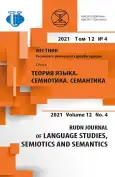The Idiolect of Ernestine de Champourcin in Terms of Cultural Accommodation
- Авторлар: Druzhkov Y.M.1, Chesnokova O.S.1
-
Мекемелер:
- Рeoples’ Friendship University of Russia (RUDN University)
- Шығарылым: Том 12, № 4 (2021)
- Беттер: 969-980
- Бөлім: DISCURSIVE STUDIES
- URL: https://journal-vniispk.ru/2313-2299/article/view/323329
- DOI: https://doi.org/10.22363/2313-2299-2021-12-4-969-980
- ID: 323329
Дәйексөз келтіру
Толық мәтін
Аннотация
This article is devoted to the idiolect of Ernestina de Champourcin, a contemporary of the Generation-27, an iconic group of Spanish poets of the 20th century. The authors propose is to consider the poetess's idiolect in the aspect of cultural accommodation beyond the traditional translation discourse, through the analysis of two poetry collections - “Presencia a oscuras” and “Primer exilio” which stand at the turn of two stages of Ernestina de Champourcin's creative work. The authors analyse the aesthetic, cognitive and linguistic vectors of the poet's idiolect and systematise the reasons for its dynamics. On the basis of the comparative analysis of the elements of the poetic idiolect of her works of different periods, the authors note that the idiolect evolves in accordance with the conditions created by cultural accommodation, and therefore the consideration of cultural accommodation is possible not only in the context of translation adequacy and equivalence, but also chronologically, at the level of idiolect, as evidenced, in particular, by the use of regional variations of lexical units, syntax and the prevalence of this or that temporal plane. The analysis of idiolect makes it possible to narrow the perspective of the material under study, and thus represents the first link of the work on poetic translation. It is argued that the translation of a poetic text is impossible without considering the “internal” cultural accommodation of the idiolect, which takes place according to the cultural accommodation of the individual and independently of the translation. Based on their analysis, the authors emphasize the role of idiolect as a key factor in the studies devoted to the chronological description of the creative formation of any poet.
Негізгі сөздер
Авторлар туралы
Yakov Druzhkov
Рeoples’ Friendship University of Russia (RUDN University)
Хат алмасуға жауапты Автор.
Email: yakovdruzhkov@gmail.com
ORCID iD: 0000-0001-6120-9850
PhD student at the Department of Foreign Languages, Faculty of Philology, Assistant at the Department of Foreign Languages of the Faculty of Humanities and Social Sciences
6, Miklukho-Maklaya Str., Moscow, Russian Federation, 117198Olga Chesnokova
Рeoples’ Friendship University of Russia (RUDN University)
Email: chesnokova-os@rudn.ru
ORCID iD: 0000-0002-1439-6267
Doctor of Philology, Professor, Department of Foreign Languages, Philological Faculty
6, Miklukho-Maklaya Str., Moscow, Russian Federation, 117198Әдебиет тізімі
- Goncharenko, S.F. (1999). Poetic translation and translation of poetry: constants and variability. In: Translator’s notebooks. Issue. 24. Moscow: MGLU. pp. 108-111. (In Russ.).
- Bogdanova, E.V. (2011). On various approaches to the investigation of idiolect in Russian and foreign linguistics. Vestnik Leningradskogo gosudarstvennogo universiteta imeni A.S. Pushkina, 1(4), 100-108. (In Russ.).
- Ledeneva, V.V. (2001). Idiostyle as a system of relationships. Tambov University Review. Series Humanities 5, 23, 12-13. (In Russ.).
- Novikova, M.L. (2013). Poetic Aspect of Ostrannenie. Verbal Image in Cultural and Historical Space. RUDN Journal of Language Studies, Semiotics and Semantics, (2), 110-120. (In Russ.).
- Valender, J. & Leyva, G. (Eds.). Poetas del exilio español: Una antología. México: D.F.: El Colegio de Mexico, 2006. doi: 10.2307/j.ctv6mtcbt
- Balló, T. (2016). Las sinsombrero. Sin ellas, la historia no está completa. Barcelona: Espasa. (In Spanish).
- Lotman, Y.M. (1996). Analysis of the Poetic Text: The Structure of Verse. On Poets and Poetry. Saint Petersburg. pp. 18-252. (In Russ.).
- Big Russian Encyclopedia (2005). URL: https://bigenc.ru/ (accessed: 23.12.2020). (In Russ.).
- Aguinaga, M. (2015). Una voz silenciada de la generación del 27: Ernestina de Champourcin. Revista Cálamo FASPE, 64, 49-55.
- Martín J.L.G. Poetas del Novecientos Entre el modernismo y la vanguardia. Antología. Tomo II. URL: http://www.cervantesvirtual.com/obra-visor/poetas-del-novecientos-entre-el-modernismo-y-la-vanguardia-antologiatomo-ii-de-guillermo-de-torre-a-ramon-gaya--0/html/000de8d0-82b2-11df-acc7-002185ce6064_14.html (accessed: 23.12.2020).
- Mendoza, S.I.G. (2006). Los exilios de Ernestina de Champourcín. Sancho el sabio: Revista de Cultura e Investigación Vasca, (25), 18-202.
- Ascunce-Arrieta, J.Á. (1995). La poesía de exilio de Ernestina de Champourcin: expresión límite de una depuración expresiva. In: Poesía y exilio: los poetas del exilio español en México. Mexico: Colegio de México.
- Jorda, R.C., Alabarce, A.S. & Valender, J. (1995). Poesía y exilio: los poetas del exilio español en México. México: El Colegio de México. Centro de Estudios Lingüísticos y Literarios: Fondo Eulalio Ferrer.
- Santoyo, J.C. (2009). El otro quehacer (olvidado): Ernestina Michels de Champourcin, traductora. Sancho el sabio: Revista de cultura e investigación vasca, 30, 255-264.
- Marién, N.M. (2000). El “primer exilio” de Ernestina de Champourcin. Exils et migrations ibériques au XXe siècle, 60 ans d’exil républicain: des poètes espagnols entre mémoire et oubli. Anthologie, 8, 149-159. DOI: https://doi.org/10.3406/emixx.2000.1048
- Calvo, M.C.M. (2015). Negación e identidad en Presencia A Oscuras, de Ernestina de Champourcín. Álabe, 2. doi: 10.15645/Alabe.2015.12.2
- Champourcín, E. de (1991). Poesía a través del tiempo. Barcelona: Anthropos.
- Champourcin, E. de (2007). Epistolario. Rosa Fernández Urtasun (ed.). Madrid: Castalia.
- Gonzalez-Allende, I. (2004). El exilio como viaje y destino final en la poesía de evocación y de deseo de Ernestina de Champourcin. Sancho el Sabio: Revista de cultura e investigación vasca, 20, 147-169.
- Dumitrescu, D. (1984). Actas de XI Congreso de la Asociación Internacional de Hispanistas. coord. por Juan Villegas. De historia, lingüísticas, retóricas y poéticas, 1, 139-147.
- Chesnokova, O.S. (2020). Spanish in Mexico: A Linguistic Picture of the World. Moscow: URSS. (In Russ.).
Қосымша файлдар









